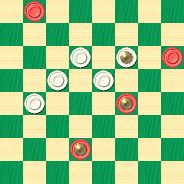The Checker Maven
Jump to navigationBeginner's Corner: You Have to Actually Win It

Check the scoreboard above. It looks like Boston has blown a really big lead and will lose a game that should have easily been a win.
Something like this also happens in checkers. It's been said about such games of pure skill that for the less experienced player winning a "won" game can be one of the toughest chores. How many times have we held a decisive advantage and let the win get away from us? We're certain every checker player alive has had this frustrating experience.
In the diagram below, White by rights ought to win the game. He's a man up, though his position is a little cramped. But it shouldn't be all that hard ... should it?

WHITE
White to Play and Win
W:W17,15,14,K11,10:BK26,K19,12,1.
Can you win this won game, or will you have one hard time with it? There just might be a little more to it than it may seem. When you've found the solution, click on Read More to verify the win that you won.![]()
Solution
10-6 1-10---A 15-6---B 19-23 6-2 26-22 11-15---C 22-13 14-9 13-6 2-9 23-27 15-19 27-32 9-14 32-27 14-18 White Wins---D.
A---19-10 similar play.
B---After this exchange, White has a definite path to the win. (We hope you didn't consider the disastrous 14-7, letting Black win easily!)
C---17-13 also wins, but surprisingly enough, pitching a man is faster and clearer. We suspect that few beginners will have seen this, so it's worthy of study.
D---The win is by First Position. If you aren't familiar with the procedure here, it would be a good idea to study up on it as it arises often in practical play.
You can email the Webmaster with comments on this article.
